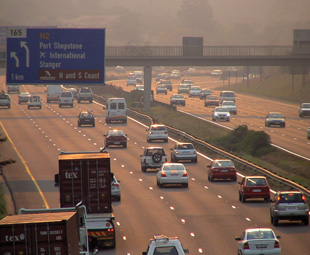N3 keeps on moving

A reduction in road crashes on the N3 toll road is good news for truckers using the route
Driven by a focus to improve safety, convenience and mobility on the N3 toll road between Heidelberg and Cedara (near Howick), the management and operating team of the N3 Toll Concession (N3TC) have done a remarkable job of reducing the number of crashes on the route.
This is good news for commercial vehicle operators. In addition to saving vehicle operating costs – which are achieved when using the N3 toll road, in comparison to using the longer alternative route between Johannesburg and Durban – operators can now enjoy the reduced risk of their vehicle being involved in an accident or incident, due to the added value that the N3TC offers its customers.
Statistics supplied by the N3TC illustrate a steady decline in terms of crashes, injury crashes, fatal crashes and fatalities, when comparing the statistics from 2013 with those of 2014.
• Crashes: -11,2 percent
• Injury crashes: -9,2 percent
• Fatal crashes: -18,2 percent
• Fatalities: -28,4 percent
The main types of crashes were identified as: head to tail (33,1 percent); vehicle roll-over (21,5 percent); vehicle leaving the road (10,2 percent); and vehicle defects (15 percent). For heavy vehicles, the critical time periods for crashes were between 04:00 and 06:00 and between 22:00 and 01:00.
The N3TC team continually monitors the road to identify hazards that could lead to accidents. Once potential danger spots are identified, the team works together with the road and law authorities and makes changes to reduce the risk.
Some of the changes that have been made are:
• The maximum speed between Warden and Harrismith has been reduced, due to the traffic hazards created by vehicles and farm tractors entering and departing farm gates along this section of the route.
• Extra acceleration and deceleration lanes have been added along the route to improve safety when vehicles are entering or departing the route.
• Road rehabilitation and maintenance is a high priority to ensure that the road surface remains in good condition, which helps to reduce vehicle accidents.
• Zero tolerance for intoxicated drivers has been adopted. The N3TC has funded the purchase of 25 Lifecol alcohol and drug screening units, as well as the training that has been given to the South African Police Service and other law-enforcement officers along the route, on how to professionally use the equipment.
• The N3TC has also sponsored the use of two extra patrol vehicles. These vehicles will be operated by the Mpofana Municipality to provide effective, highly visible law enforcement in the Mooi River area.
A previous FOCUS article published in 2010 proved that truck operators using the N3 toll road between Johannesburg and Durban – instead of using the alternative route and not paying the toll fees – could save 16 percent of their operating costs. Now that the route is safer and the risk of a vehicle being involved in an accident has been reduced, using the N3 toll route is definitely a wiser choice than ever.
One of this country’s most respected commercial vehicle industry authorities, VIC OLIVER has been in this industry for over 50 years. Before joining the FOCUS team, he spent 15 years with Nissan Diesel (now UD Trucks), 11 years with Busaf and seven years with International.
Published by
Focus on Transport
focusmagsa




